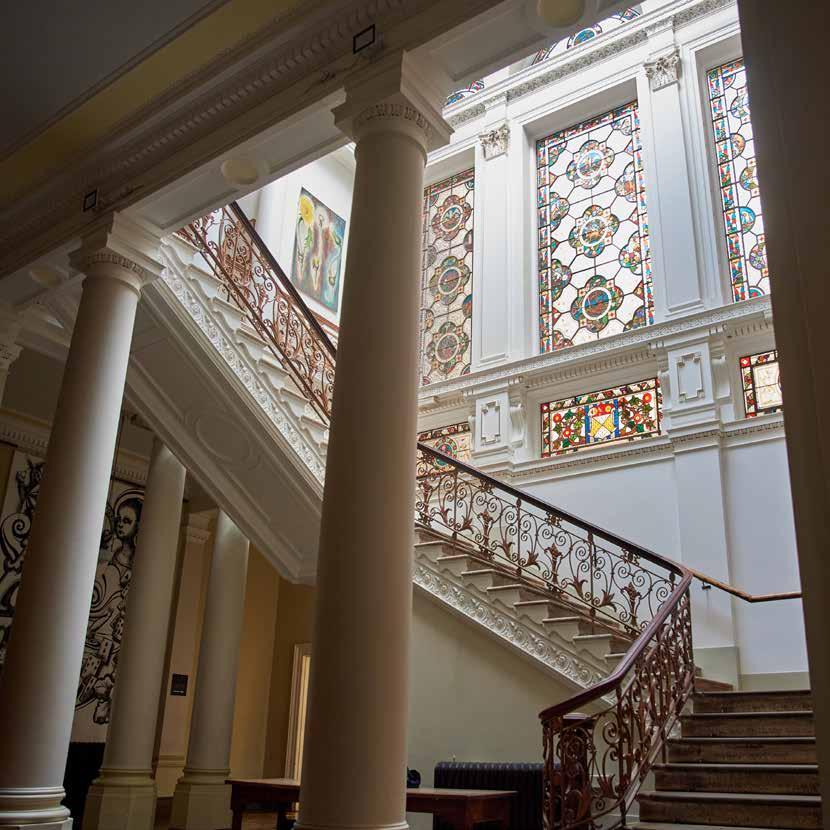

Rendcomb College Senior School
Thoughtful, Adventurous, Ambitious
“ An idyllic school which expects to keep its youngsters until the end of their schooldays and where they can grow into themselves, learn and experience wonderful things. ”
The Good Schools Guide
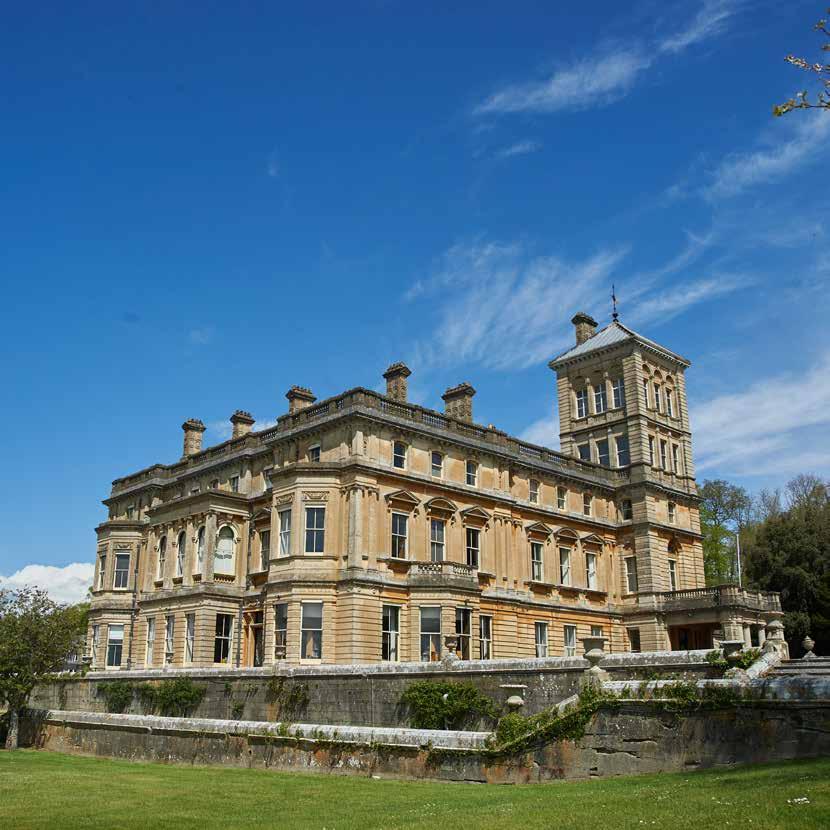
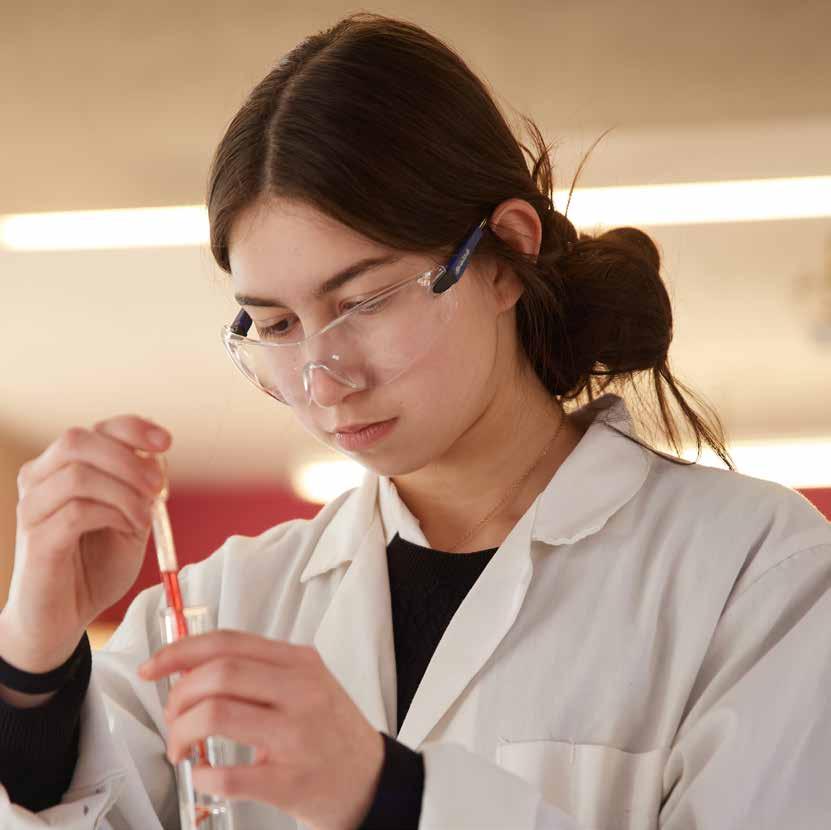
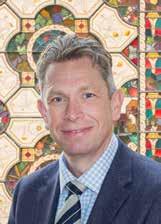
Welcome to Rendcomb College Senior School and thank you for taking the time to explore what we have to offer. While this brochure will give you a real flavour of Rendcomb, our wonderful school can only be fully appreciated by experiencing it in person.
At Rendcomb College, we provide a strong academic foundation, with a warm and supportive pastoral system which ensures that every pupil is valued and encouraged to reach their full potential. At the same time, our pupils are given the freedom and space to be adventurous in their learning and development - whether that’s through our varied co-curricular programme, outdoor pursuits, or leadership opportunities.
Our Senior School campus is nestled within 230 acres of stunning Cotswold countryside, providing an inspiring and serene setting in which students can learn, grow, reflect and discover their passions. This natural environment is not just a backdrop, it is integral to our educational ethos, helping to instil a sense of wellbeing, nature and nurture.
Rendcomb Senior School fosters a unique sense of continuity and community where students benefit from small class sizes and tailored teaching, enabling them to flourish both academically and personally.
We recognise that every learner’s journey is different, and whether you are considering joining us in Year 7, Year 9, or Sixth Form, we will guide and support your transition every step of the way. Our Admissions Team would be delighted to speak with you about your individual circumstances and help you take the next steps. Contact our team at www. rendcombcollege.org.uk/admissions.
We warmly invite you to come and visit us. Walk through our grounds, meet our staff and pupils, and discover for yourself the thoughtful, ambitious and adventurous spirit that defines life at Rendcomb College.

Andy Murphy MSc, BSc (Hons), PGCE Head of College
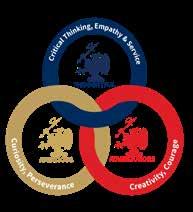

Rendcomb in Numbers
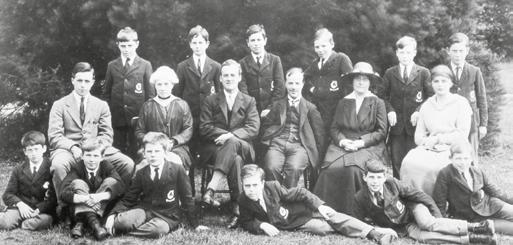
1920 Rendcomb College was opened as a boarding school for just 12 boys by Frederick Noel Hamilton Wills. Now, the College is a day and boarding school for around 400 boys and girls aged 3 to 18.
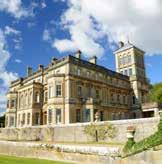
20 is the maximum number of children in any class at Rendcomb College. Our small classes allow individuals to be nurtured and flourish.
230 Pupils make use of 230 acres of grounds which includes parkland, sports pitches and formal lawns. We provide a safe, stimulating and enchanting environment for our pupils.
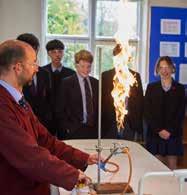
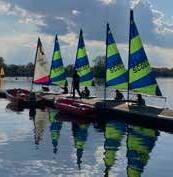
74 The College has a herd of around 74 fallow deer in the Deer Park which features in the Domesday Book.
100 is the number of co-curricular activities that take place each term. The activities vary and pupils can choose up to 3 activities to participate in each week.
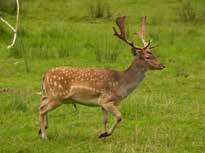
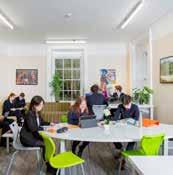
22 is the number of Sixth Form subjects on offer. Traditional subjects can be studied alongside vocational subjects such as Business, Sport and Psychology.
Find out more about Rendcomb College on our website: www.rendcombcollege.org.uk or contact our Admissions Team on: 01285 832306 admissions@rendcombcollege.org.uk

Our Mission
Our mission is to develop thoughtful, adventurous and ambitious young people who are life-long learners. We aim to prepare them with the character and skills to succeed in the ever-changing world after school. Our pupils have the freedom to experience, explore and enquire about the world around them. We aim to encourage independence and tolerance in a safe, caring community and magnificent natural environment.
To achieve this we will:
• Promote a growth mind-set, where abilities can be developed through dedication and hard-work
• Provide a co-curriculum that will challenge and support character development, leadership and teamwork
• Encourage individualism, creativity and contribution to a nurturing and collaborative community
• Engender physical, spiritual and mental well-being through a strong pastoral system
• Prepare pupils for life beyond school
• Develop an appreciation for and responsible attitude towards their environment and surroundings.
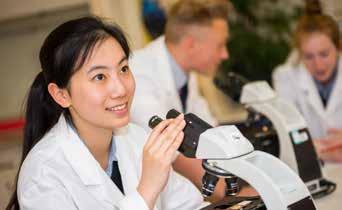
A Family School
We know how important a caring environment is for our pupils and Rendcomb College provides a real home from home for both day pupils and boarders. Pupils both past and present talk fondly of the family feel at Rendcomb College.
We employ a buddy system, ensuring that new members of the community make friends easily and settle in quickly. Houseparents support pastoral needs and pupils are fully integrated whether day or boarding. In addition, every pupil has an academic tutor to oversee their progress.
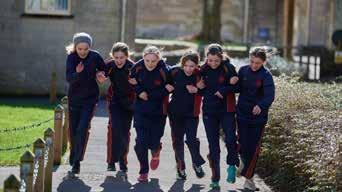
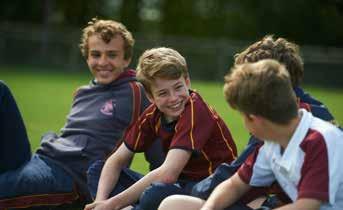

Joining Rendcomb College
The Admissions Journey
A typical journey would entail the following steps:
• Initial Enquiry
• Open Morning / Personalised Visit
• Registration
• Assessments
• Offer of a place
• Acceptance
Visiting Rendcomb College
We encourage all families to visit Rendcomb College and acknowledge that seeing the school first-hand is instrumental in the decision making process. Our open events throughout the year give the best opportunity to see the school in full and to experience all that we have to offer.
During a visit, you will be met by the Admissions Team, followed by an appointment with our Head of College, Mr Andy Murphy or one of his deputies. A personal tour of the College, conducted by one of our members of staff allows you to experience the school day, meet with teaching staff, and ask any questions to our greatest assets; the pupils.
Registration
Deadlines apply to key entry points. Subject to availability, registration can be accepted throughout the year. In order to register your child, please complete the Registration Form and return it together with the non-refundable Registration Fee of £100, a copy of their passport and two most recent school reports.
Registration adds your child onto our entry lists and is required prior to the next steps but does not guarantee a place. If your child is currently at Rendcomb College Junior School, they are automatically registered and no additional fee is required.
We believe in developing the whole child and this is reflected in our entrance procedures. Pupils are selected on whether we believe that they will thrive at Rendcomb College, meaning that the meeting with Mr Jones or one of his deputies, the school reference and previous reports all make up an important part of the offer process.
Year 7
For September entry, candidates sit examinations in the preceding November during our Entrance Assessment Day. Candidates will sit a written examination, take an online *CEM test and, following lunch, will take part in a carousel of co-curricular activities; a key aspect of College life.
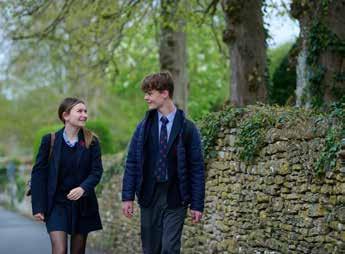

The deadline for applications for September entry is the preceding October. Places are offered subject to candidates taking part in our Entrance Assessment Day. Entrance assessments may be sat at a later date during the year ahead of September depending on the availability of places in Year 7.
Year 9
All candidates looking at Year 9 entry sit our entrance assessment and maths test in November before entry. Pupils from prep schools are also asked to share their Common Entrance results.
Year 12
All candidates are required to achieve a minimum of 5 grade 4 or above at GCSE with a minimum of grade 6 in the chosen A Level subjects. Grade 4 and above should be achieved in Mathematics and English. To study Mathematics and Science A Levels, candidates must achieve an A or 7 grade at GCSE. Candidates should also provide a full school report and a reference. Candidates may be asked to sit individual subject papers before confirming their subject choices. Conditional places are offered based on mock results and candidates are asked to share these as soon as they are given.
Shadow Days
Candidates may take part in a Shadow Day following an offer of a place. Shadow Days provide an opportunity for children to feel more at home in an unfamiliar environment and can be arranged at the parents’ request. Rendcomb College Junior School pupils will attend a ‘Senior School Taster Day’ during the Year 5 school year and a ‘Moving Up Morning’ during Year 6.
Acceptance
The Acceptance Form will be sent alongside an offer of a place for your child (both conditional and unconditional). The Acceptance Form will need to be completed, signed by both parents and returned to the Admissions Office with the Acceptance Deposit of £500 by the deadline date given in the offer letter. Junior School parents are required to top up their existing deposit.
The Acceptance Form will be provided alongside a copy of our Parent Contract containing our terms and conditions. The Acceptance Deposit shall be refunded at the time the pupil leaves Rendcomb College (minus any sums owed).
Induction Day and Joining Instructions
A welcoming Induction Day for all new Senior School pupils is held in June for UK parents and all new senior school pupils starting in September that year. The day allows families to ask questions, hear from members of staff, and learn of the next steps involved.
Buses
Bus services currently run from Cirencester, Swindon, Cheltenham, Fairford, Kemble, Tetbury, Stroud and Bourton-on-the-Water. An up-to-date timetable is on our website.
*CEM
The Centre for Evaluation and Monitoring (CEM) test is an examination which delivers crucial information about your child’s abilities. The online test lasts approximately 45 to 60 minutes. The CEM test assesses Maths, English, Verbal and Non-Verbal Reasoning. No preparation is required and a familiarisation website is available at: www.rendcombcollege.org.uk/CEM.

Our Curriculum
Rendcomb College offers a broad and balanced study programme to enable an all-round education in keeping with a common educational curriculum.
Pupils in Years 7, 8 and 9 have access to the following subjects:
• Art and Design
• Biology
• Chemistry
• Computer Science
• Design and Technology
• Drama
• English
• French
• Games
• Geography
Learning Support
• History
• Mathematics
• Music
• Personal, Social and Health Education
• Physical Education
• Physics
• Religious Studies
• Spanish
• Food & Nutrition
Our three specialist teachers are qualified to Masters level and are able to diagnostically assess pupils for learning differences. Assistive technology, including the latest iPads and Surface Pros, enables pupils to be independent in class through using speech-to-text functions and apps recommended for dyslexic learners.
Gifted and Talented
Provision for pupils that show a particular aptitude in both academic and other subjects is fully supported at Rendcomb College. The Bitner-Glindzicz group runs from years 7-10, and the Suffolk group for years 11-13. AQA LV2
Further Maths is also available to able Y11 mathematicians.
GCSEs
In Year 10 and Year 11, pupils study for their GCSE examinations. The majority of pupils will sit 10 subject exams.
Core Subjects:
• Biology
• Chemistry
• Mathematics
• Physics
• English (Language and Literature)
Additional subjects chosen from:
• Art
• Business Studies (BTEC level 2)
• Computer Science
• Design Technology
• Drama
• English as an Additional Language
• French
• German
• Geography
• History
• Hospitality and Catering (WJEC Level 1/2)
• Music
• PE
• Spanish
There are also classes in Personal, Social and Health Education and Learning to Learn.
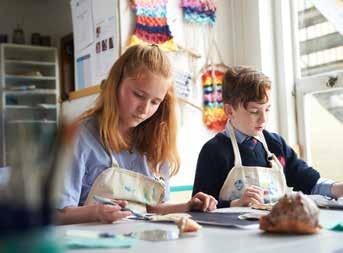

Sixth Form
Pupils choose from traditional A-Level, vocational or a blended pathway. Option blocks are finalised during the Lent Term:
• Art
• Biology
• Business (BTEC Level 3 Extended Certificate)
• Chemistry
• Computer Science
• Design and Technology
• Drama and Theatre Studies
• Economics
• English Literature
• French
• Further Mathematics
• Geography
• History
• Mathematics
• Music
• Photography
• National Sport (BTEC Level 3 Extended Certificate)
• Physics
• Psychology
• Spanish
Most pupils take three subjects with examinations taken at the end of Year 13. Pupils can elect to take the EPQ, Sports Leader or Arts Award, enabling them to gain further UCAS points. All pupils take C3 lessons and Personal, Social and Health Education.
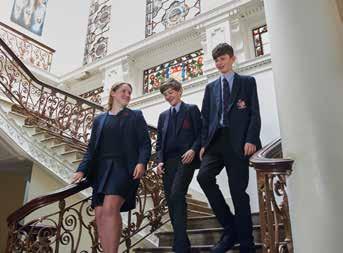
C3 (C Cubed) Programme
C3 stands for Creation, Collaboration and Communication. This is a weekly session giving pupils the opportunity to practise note-taking, research, debating, public speaking and team work skills through a carousel of enriching topics.
Academic Support
Approximately every half term there is an academic assessment of approach to learning and attainment in each subject. Grades are discussed individually with a personal academic tutor, with whom each pupil meets daily, so that targets can be set and further support or encouragement given where it is needed.
In the Sixth Form, the academic tutor works closely with the student to achieve the best possible examination results. This programme is supported by regular assessment and reporting.
Study Time
Every pupil leaves Rendcomb College knowing how to maximise the time devoted to independent study. From Year 7, pupils are set prep that gradually increases to a maximum of 2 hours per night by Year 11. In the Sixth Form, pupils spend at least 5 hours per week working on each subject outside of lesson times.
Examinations
All pupils work towards public examinations at the end of Year 11 and in Year 13. At the end of all other years, there are formal examinations to monitor progress and give vital practice in answering questions under examination conditions. Formal mock examinations take place in Year 11 to Year 13. These provide a valuable assessment for UCAS Forms and help predict final results.

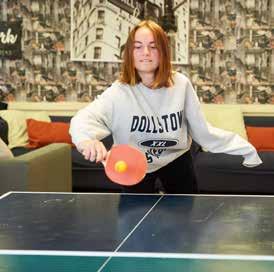
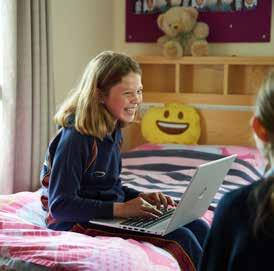
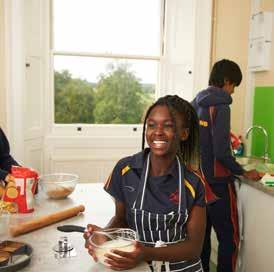
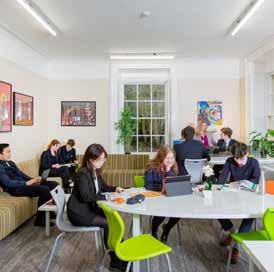
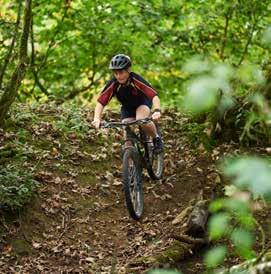
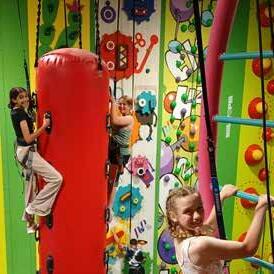
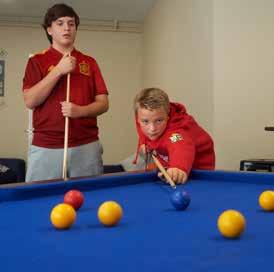
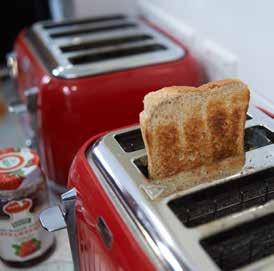
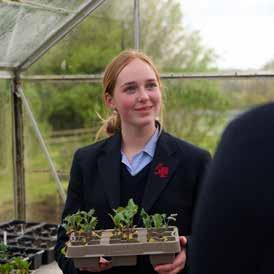
Our Houses and Boarding
On joining the Senior School, pupils are allocated to a House. Both day pupils and boarders share the same houses enabling strong friendships and comradery to flourish throughout the College.
Godman House - Year 7 to 9 boys and girls
Stable House - Year 10 to 13 girls
Lawn House - Year 10 to 13 boys
Our four houses are located around the school’s campus and within easy reach of classrooms and sports facilities. There are a number of boarding options from occasional and flexi boarding to full boarding. Day pupils can also book an overnight stay on an ad-hoc basis.
Day pupils have the option to stay after school and join in with House activities and be picked up in the evening. There is a small fee which covers the cost of supper.
Weekends
There are no Saturday lessons at Rendcomb College and a range of enriching activities are put on for boarders and day pupils on Saturday mornings. For day pupils, these activities are optional. Competitive sports fixtures take place on Saturdays and those pupils selected to compete for Rendcomb College must attend. Each Sunday there is a trip or activity that boarders can sign up to. These activities include go-karting, bowling, shopping, watching a professional sports fixture, mountain biking and skiing, to name just a few.
Further information can be found in our House Handbook available from the Admissions Office.
Independent Living in Garden House
Both day and boarding students in the Upper Sixth spend two weeks taking responsibility for themselves in the on-site cottage, Garden House. The modern and stylish interior provides an environment for students to experience a taste of what life after school will be like. Students manage their own budget and shop, cook, clean and do their own laundry. One evening during the week they also put their cooking skills to the test by entertaining a few chosen members of staff.
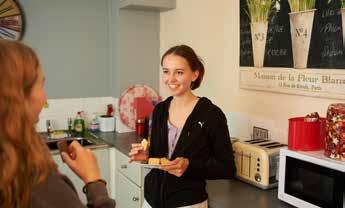
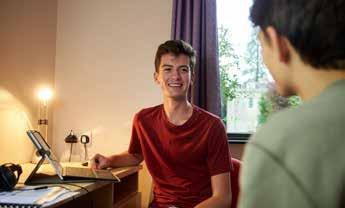

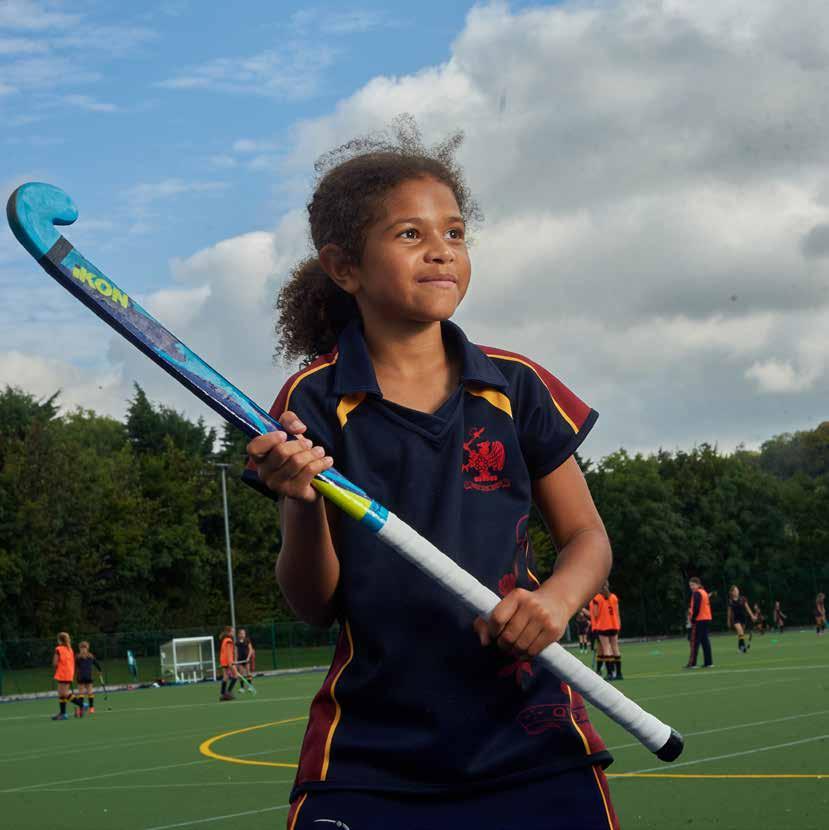
Sports
Our sports programme offers a breadth of opportunity, enabling pupils to experience participation, competition and performance. Sporting talents are acknowledged in District, County and International fields, with fixtures played in all major sports and some minor sports too.
In 2018 we opened our new astroturf pitch and refurbished the gym. These new sports facilities are enjoyed by pupils across the College.
Major Sports Per Term
Term Boys Girls
Michaelmas Rugby Hockey
Lent Hockey Lacrosse
Summer Cricket/Tennis Cricket/Tennis
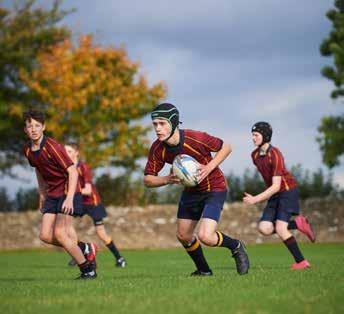
Activities
More than 100 co-curricular activities are on offer each term. This enriches their school experience while they gain new life skills. Pupils mix and make friends across year groups for these activities.
• Art and Decoupage
• Badminton
• Bell Ringing
• Chess
• Choir
• Clay Pigeon Shooting
• Computing
• Duke of Edinburgh’s Award
• Debating
• Design Technology
• Dissection Club
• Drama and Musicals
• Enterprise
• Equestrian
• Fitness Training
• Lacrosse
• Lotions and Potions
• Netball
• Mountain Biking
• Orchestra
• Photography
• Sailing
• Tennis
• And many more…
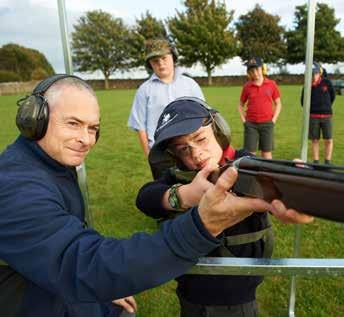

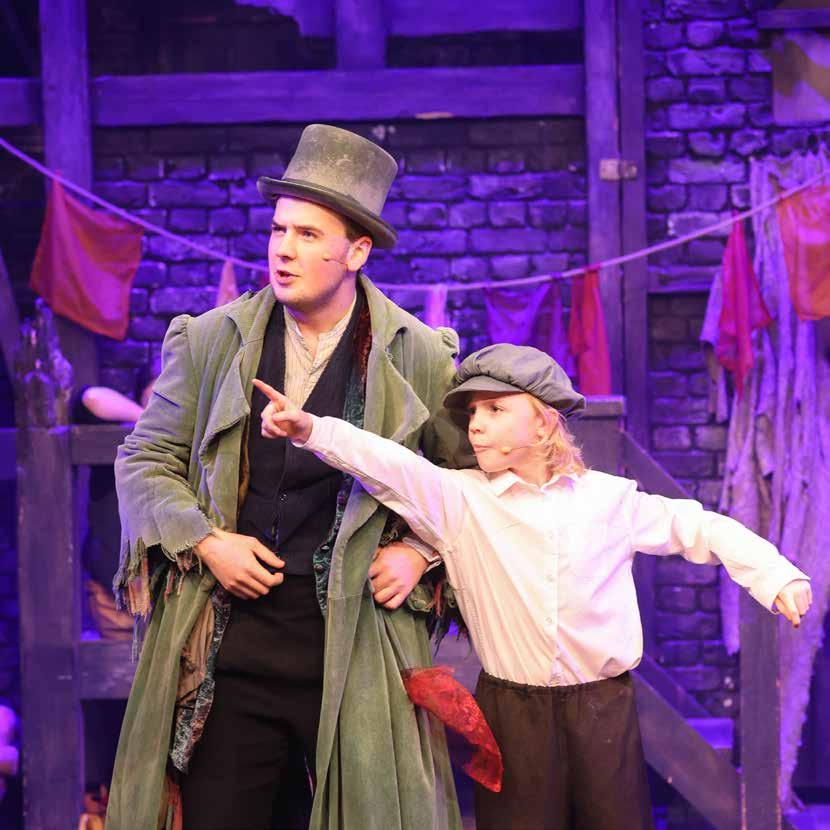
Drama
Our state of the art £3.3m performing arts centre is in the heart of our campus. Used by pupils throughout the College, the complex, named The Griffin Theatre, provides an industry standard performance and rehearsal space for pupils to practice, perform and nurture their creative talents.
Senior School pupils can take part in two main performances each year which alternate between plays and musicals. Recent productions include We Will Rock You, Beauty and the Beast, Oliver! and, Harry Potter and the Cursed Child. The Drama Club attends regular performances both locally and in London’s West End. In addition to performing, pupils who are interested in stage management, lighting and sound have the opportunity to work alongside professionals.
LAMDA
We offer LAMDA (London Academy of Music and Dramatic Art) exams at Rendcomb College and the sessions cover a range of disciplines including:
• Acting
• Devising drama
• Miming
• Speaking verse and prose
• Reading for performance
• Using spoken English
• Speaking in public
• Musical theatre
LAMDA exams offer an ongoing measurement of progress in Speech and Drama. The gradual progression through the LAMDA grades provides benchmarks for every stage of a pupil’s development. It helps to support a steady improvement in self-confidence, vocal and physical technique, and language awareness.
Dance
Our dance studio is located within The Griffin Theatre and benefits from a sprung floor, air conditioning, a PA system, a ballet barre and mirrors.
Pupils can participate in a number of dance sessions including:
• Level 1 Dance (Grade 4 level Dance: ballet and additional dance styles)
• Level 2 Dance (Grade 5 level Dance: ballet and additional dance styles)
• Level 3 Dance (Grade 6/Vocational level Dance: ballet and pointe work)
• Stretch and Tone (All levels)
• Contemporary 1 (Beginners/Intermediate)
• Contemporary 2 (Advanced)
• Performance Group: Senior School (dance experience not essential but commitment required)
• Intermediate Foundation/Intermediate ballet and pointe work
Pupils perform regularly and can enter classes at the Cheltenham Festival of Performing Arts and can compete in The Great Big Dance Off at the Wyvern Theatre in Swindon.
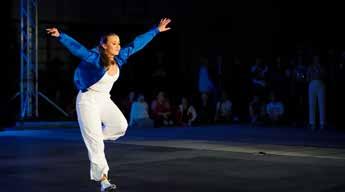

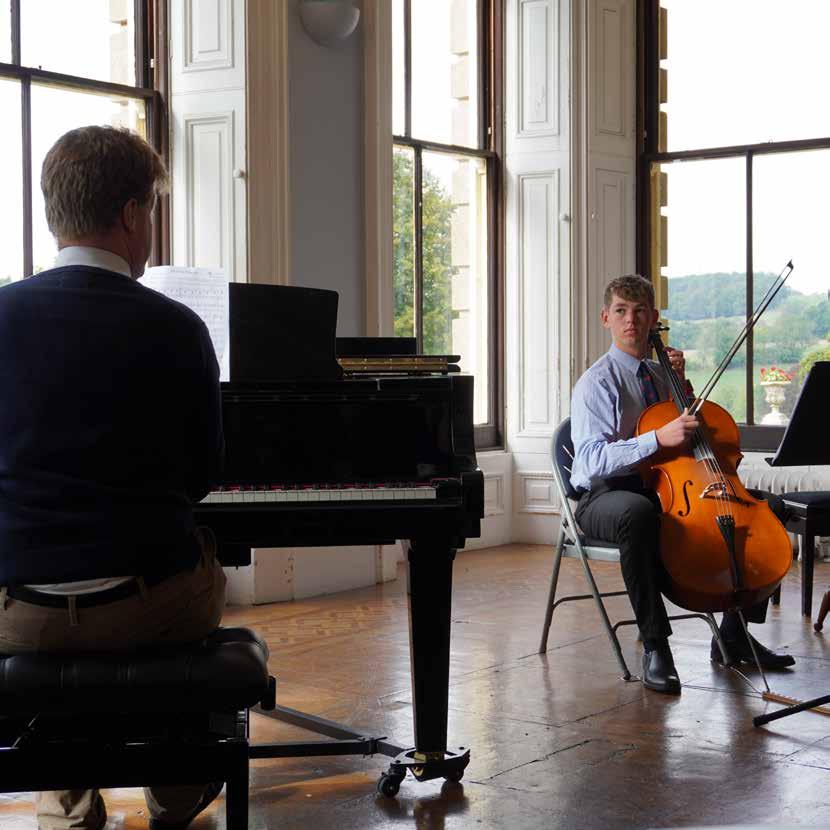
Music
Our Music Department is vibrant and varied with many pupils taking individual instrumental lessons in addition to their timetabled music lessons.
Pupils are encouraged to join the many ensembles and activities on offer which include:
• College Choir
• Chamber Choir
• Orchestra
• Music Theory Club
• Ukulele Club
• Clarinet Ensemble
• Rock Band
• Jazz Ensemble
• Composition Club
• A Capella / Barbershop
• Choral Society
With a team of dedicated musicians, pupils have the opportunity to have one-to-one tuition in almost every instrument and style, helping to build skills that will enrich lives and potentially fuel a desire for a future career in music.
Our musicians are given many opportunities to perform on both informal and formal occasions. Regular Coffee Concerts take place at break and lunch times in our resonating Reading Room, while our termly Concerts offer a wonderful platform for pupils to showcase their talents.
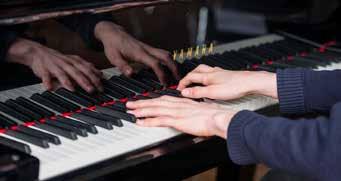
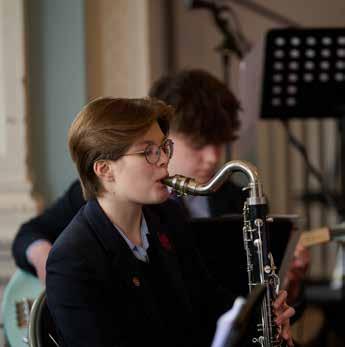
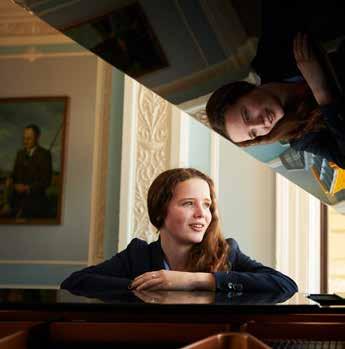

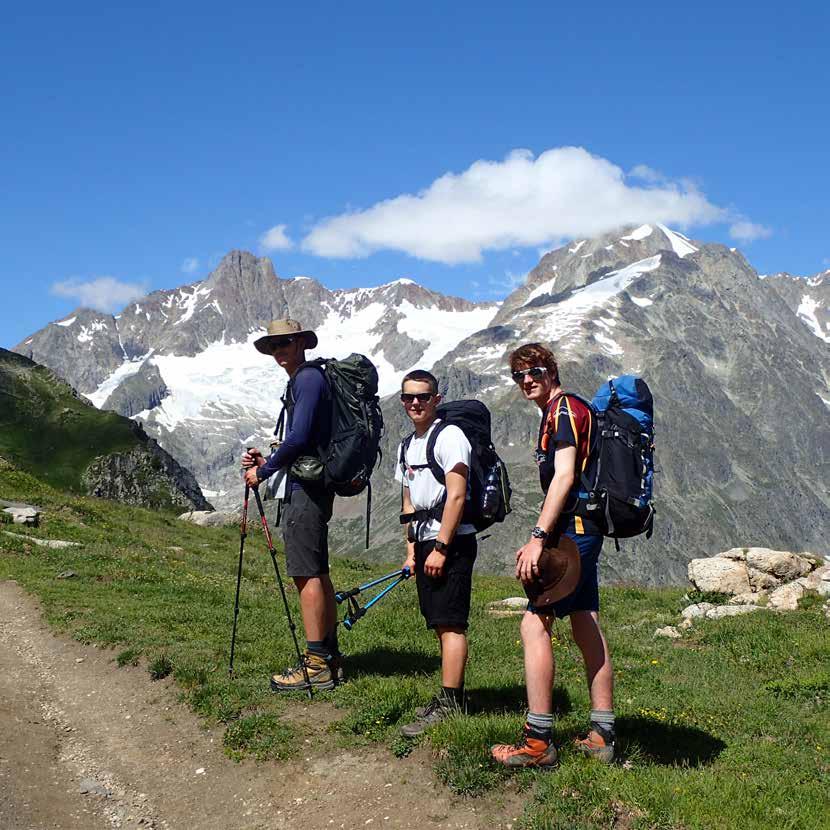
Young Adventurers
Pupils benefit from a dedicated Outdoor Education area within the College grounds providing a multitude of opportunities for activities such as bush craft, leadership, orienteering and the Duke of Edinburgh’s Award.
These outdoor activities are successful at developing each pupil’s physical, co-ordination and social skills. Pupils learn to work with others in a group and to express themselves as independent learners.
Pupils apply numeracy, literacy, science and many other subjects in this hands-on and stimulating environment.
Pupils may also attend the off-site day and residential trips which include many adventurous activities; in 2019 a group explored Mont Blanc and Patagonia!
Duke of Edinburgh’s Award
As part of our leadership programme, we offer the Duke of Edinburgh’s Award to Gold standard. This involves expeditions to locations such as Dartmoor, Exmoor and the Black Mountains in Wales.
Many young people find achieving a DofE Award life-changing. A fun adventure and major challenge, the three progressive Awards, Bronze, Silver and Gold offer endless possibilities. Pupils push their own personal boundaries, gain new skills and enhance their CVs and university applications.
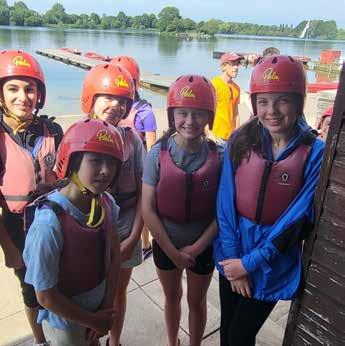
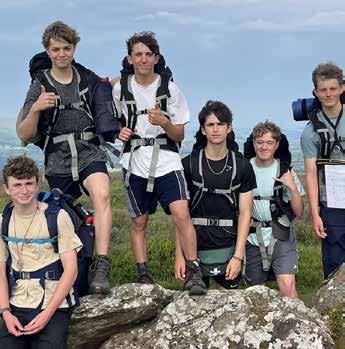

Leaders of the Future
Leadership is an integral part of Rendcomb College life and pupils are given the opportunity to act as leaders in a number of areas.
Pupils aspire to achieve leading roles and the school Prefects and Head Boy and Girl are chosen after a formal application process to take on major leadership positions throughout the College. Prefects speak regularly at formal occasions and work alongside the staff in the running of the College. Some Prefects have specific roles in the boarding houses and act as listeners and advisers.
Sixth Form students also sit on school committees such as the School Council, the Food Committee, the Sports Committee and various social committees.
Global Social Leaders
Part of the Future Foundations, ‘Global Social Leaders’ provides students with the opportunity to lead, manage and plan social action projects. Residential courses and networking are also part of the programme linking with other prestigious schools globally.
Community Links
Pupils work with local primary schools and care homes, providing a number of services under our outreach programme. Letter writing to solitary residents, the publication of a children’s book and the renovation of a care home garden are all things that previous groups have organised, undertaken and completed.
Sports Leader Qualification
A UCAS recognised points carrying course, which allows pupils to develop their leadership skills whilst helping themselves and others stay active. Students will plan, lead and evaluate sessions over a number of tutored hours and then demonstrate their leadership skills as part of their assessment.
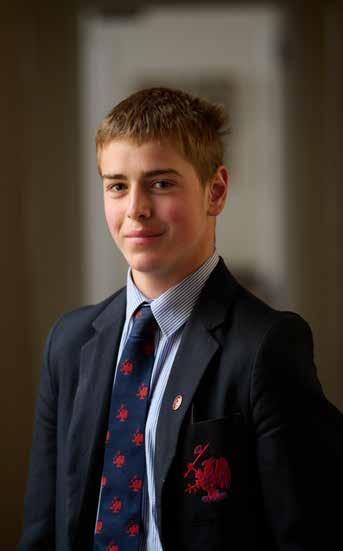

Rendcomb and Beyond
We encourage Rendcombians to think independently, to challenge and to engage. We provide a pastoral framework that creates physical, emotional and spiritual wellbeing, preparing pupils for life beyond College, and fostering confidence, self-reliance and honesty.
The majority of our students go on to Higher Education after A Levels and information about UCAS applications, apprenticeships, gap years and employability skills is provided through a ‘Moving On’ Conference in Year 12.
GCSE Results 2025
29% achieved 9-7 grades, 54% achieved 9-6 grades
A Level Results 2025
33% of results were A* to A grades, 59% were A* to B grades.
Destinations
In the last three years, students have gone on to Oxbridge, Russell Group and other universities to study a range of courses including:
• Law at Oxford
• Law at Cambridge
• Medicine at Exeter
• French Literature at Oxford
• Veterinary Medicine and Science at Surrey
• Mathematics with Statistics at Imperial College London
• Chemistry at Durham
• Artificial Intelligence at Birmingham
• Genetics at Manchester
• Film Studies at London Southbank
• Criminology at Cardiff
• Fine Art at Bath Spa
Aspirations
Oxbridge
For students who aspire to apply to Oxford or Cambridge, we support and encourage them throughout their journey. Students will work with teachers to develop their skills and to extend and challenge them in their chosen subject/s.
Oxbridge applicants are supported throughout the process by the Head of Sixth Form and mock interviews are arranged with external business experts who give feedback and experience to candidates ahead of the official interview.
Medical and Veterinary Studies
We have a thriving MedVet Society which meets regularly in addition to a Dissection Club. The Science Department support medical applicants through BMAT or UKCAT practice, providing extra reading and assisting with work experience and personal statements. Our Bioethics Debating Society also helps with preparation for discussing medical ethical issues.
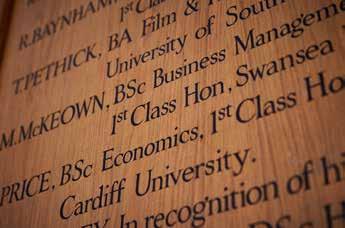

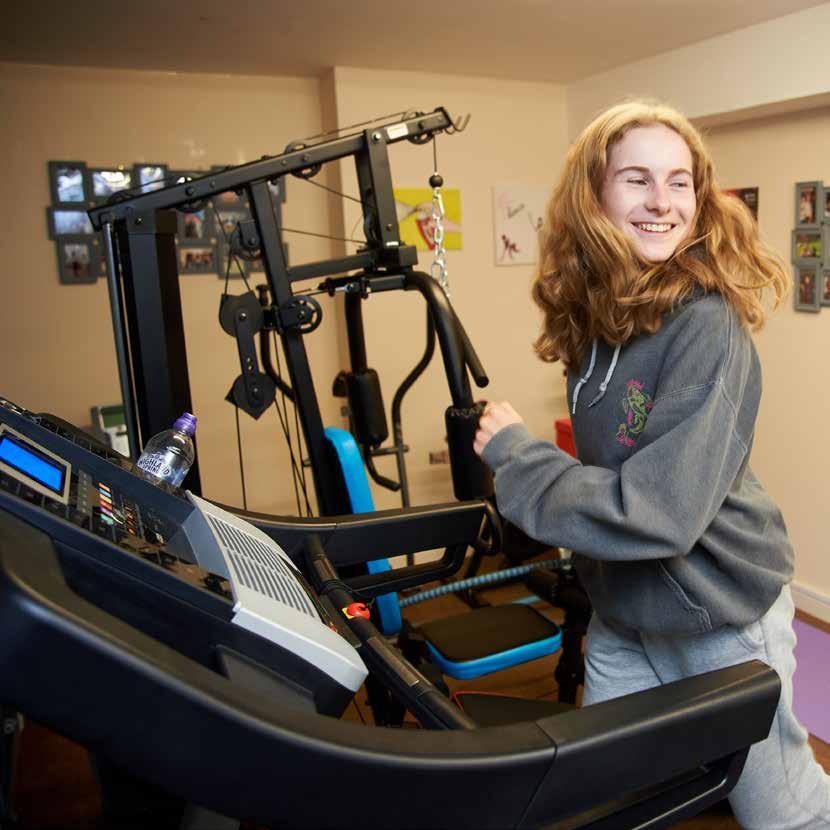
Facilities
Within our 230 acre campus, pupils have access to extensive indoor and outdoor facilities.
We are continually developing our provision and recently we have invested substantially in our sports provision and our STEAM (Science, Technology, Engineering, Arts and Mathematics) subjects.
This investment includes:
• A new astroturf installed to England Hockey standards and a refurbished gym with new strength and conditioning equipment.
• Science Laboratories with university-grade fume cupboards and separate benches and classroom areas.
• Our Computing Suite boasts cutting-edge equipment such as 3D printers, Raspberry Pi computers, virtual reality headsets and the latest computers for pupils to learn and progress in a hands-on environment.
• Our state-of-the-art performing arts centre, the Griffin Theatre, features a 350-seat auditorium, dance studio and high-specification audio visual technology.
In 2020 our new Sixth Form Centre opened in the heart of the campus within the Old Rectory, a former boarding house. It features study spaces, meeting rooms, classrooms and a cafe.
In addition, pupils have access to extensive sports facilities with 10 acres of stunning grass pitches, tennis courts, and a large sports hall with cricket nets. Within the grounds of Rendcomb College is a Deer Park with around 74 fallow deer, a heated outdoor swimming pool, a clay pigeon shooting ground and an outdoor education area; The Wilderness.
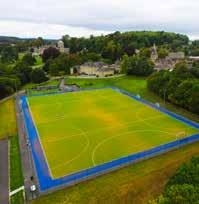
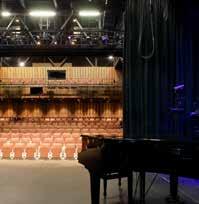
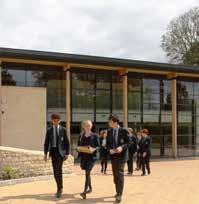
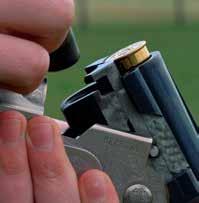
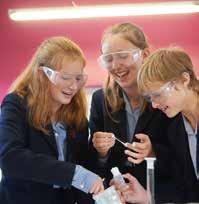
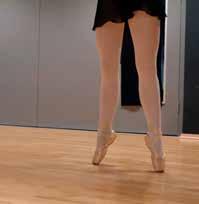
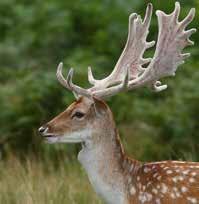
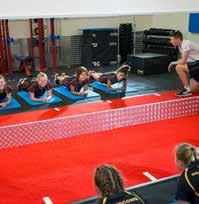
What The Good Schools Guide says
Head of College

From September 2025, Andy Murphy, currently senior deputy head at Stamford School.
Raised in Scotland, he read biology at the University of Edinburgh, then ventured south to the University of Oxford, where he did a master’s in science and a PGCE. He worked in marketing for Guinness and Heineken before moving into teaching. Before Stamford, he taught at Felsted and Stowe, gaining experience in both boarding and day environments and in small and large schools. Married to Gabi, a marketeer turned teacher, with two children and a golden retriever. He loves sport, plays cricket, rugby, hockey and football, and is a keen crosscountry runner, with a number of marathons under his belt.
The junior school is headed by Gavin Roberts, promoted from deputy in 2017. Before that he was at the Cathedral School Llandaff for several years, teaching English to both juniors and seniors, plus junior maths. A proud and unmistakeable Welshman and qualified WRU referee, he engages brilliantly with the children and tolerates the parents, remarked one mother wryly. ‘He’s funny and jokes with us, but can shout when we’re naughty,’ say his young charges. Married to Jen, who teaches younger children in the junior school. Off the pitch and outside the school gates, he enjoys theatre and live music.
“We were quite won over by his talk of the Rendcomb family and the seesaw between ambition/challenge and support/nurture...”
Entrance
Straight into the nursery from the age of three. Junior school hopefuls have to attend a taster day, a twoway process designed to check the fit between child and school and a chance for some informal academic assessment. All entrants for the senior school, including the 80 per cent from the junior school, do online CEM assessments in verbal, non-verbal and mathematical skills, a process designed to show academic ability and potential, rather than the regurgitation of facts requiring masses of cramming. Main entry points are years 7 and 9, but the school can adapt well to other entry points. Children arrive from local prep schools and the odd primary. At sixth form, the handful of new applicants need five GCSE passes above a grade 4, including English and maths; grade 6 or above in any subject to be taken to A level, except maths and science, which require a 7. A helpful timeline for admissions is on the school website. All international students do age-appropriate written papers in English and maths; verbal reasoning also for anyone below sixth form.
Exit
Most junior pupils to the senior school (any child unlikely to make it will have been identified a couple of years before); tiny numbers to local state schools. As an ‘unashamedly through school’, no CE or 11+ prep, eg for very competitive Gloucestershire grammars, is laid on. Some leave the senior school after GCSE but are replaced by incomers. The expectation is higher education at the end of their school careers: the odd Oxbridge success, a medic or two, a handful to art or music college (a recent scholarship to the Royal Welsh College of Music and Drama) and everyone else to a range of universities, Swansea and Bath being especially popular.

Latest results
In 2024, 39 per cent 9-7 at GCSE; 33 per cent A*/A at A level (58 per cent A*-B).
Teaching and learning
The junior school follows the national curriculum, but peps it up with some French (specialist teachers for that, music and PE) and lots of time in the marvellous forest school, which is what it says - not some apologetic little patch of scrub off the playground. Sitting on a log watching small and energetic children work through a checklist of minibeasts to find was heart-warming – and boy, they were not shy of getting their little hands dirty! Two small classes per year group, where the children are set by maths: one was tackling fractions using exercise books and pencils, but there is no shortage of tech – they just use it wisely. Own lab, library, DT and computing facilities. We loved their remake of the Bayeux tapestry, with felt figures stuck on a hessian background. While the children clearly have a lovely time at school, one parent felt that the cleverest were not stretched enough and that differentiation was not as developed as it should be, even though there is scope to move bright sparks into the class above for spelling and phonics.
Twenty-five subjects are listed on the senior school curriculum, some of which (economics and business studies, for example) are available only at A level. General science only for the first two years and a choice of two out of three modern languages offered; no classics at all. We liked the sound of the themes of environment, empowerment and entrepreneurship linking parts of the curriculum at this stage. Ten GCSEs are the norm, with compulsory maths, English and sciences. Options include four level 2 BTECs (or equivalent) in sport, business studies, travel/tourism
and hospitality. One or two year intense GCSE courses are offered to international students. A levels and two BTECs in business studies and PE are on offer at sixth form, the expectation being three subjects studied; EPQ is optional, as is the school’s own gold arts award, where students create a portfolio, then design and deliver an event. Sixth form biologists were gazing intently at garlic cells under the microscope and in an English class, a rigorous analysis of a comprehension was taking place the day we visited. School operates a policy of ‘bring your own device’, duly checked and linked to the school’s system. Teams is now the mode of communication between teachers and students, but, as the head said, ‘A balance is had. Nothing beats the authentic relationship between teacher and pupil.’ Strenuous efforts made over the last few years to dispel any notion that Rendcomb does not take academic matters seriously are paying off, but the approach is oblique: ‘Our focus on the pupils rather than the exams, and developing the whole person, mean the results take care of themselves,’ as the head put it. Parents greatly rate the way the school gets their children to where they need to be, without undue pressure: ‘It’s academically very integrated,’ one told us. Small class sizes in what is actually quite a small school prevent students feeling as overwhelmed as they might in a larger setting. It could not be further from a hothouse if it tried – hurrah for that.
Learning support and SEN
Exceptional – and we don’t often say that. Part of it is the beautiful new centre opened right next to the sixth form centre in 2021, expressly designed as a calm space with the minimum of sensory stress, hence muted décor, bare walls and frosted glass for the computer room so students can fully focus on their screens. Part of it is the highly qualified learning development (sic) team, with two holding masters degrees in inclusive

education and able to assess and diagnose learning differences, plus in-house ADD and ASC specialists. Yet a third part is the way in which co-curricular activities are designed to suit everyone, eg students needing small group or solitary activities such as bell-ringing, paddle-boarding or knitting. The centre has its own garden whose lawn is mown by students benefitting from that kind of regular physical activity, and whose design is conceived by mix of dig, design, debate - it gets kids talking without eye contact. ‘Our governors are not obsessed by numbers, so we can try out individualised hobbies,’ the SENDCo (with the longest string of letters after her name that we had ever seen) told us. Working closely with the admissions department, everyone is screened in years 2 and 7 or on arrival, so that any extra needs are picked up early. Some support is provided in class, and some one-to-one. Exam support is skilfully laid on – we met one staff member fresh from scribing for a GCSE student – and underpinned by a long look at things like individual working memory and processing speed. No fewer than three dyslexic students recently tried Oxbridge and guidance is given throughout the UCAS application process, eg steering students towards campus universities in cases where they would find that environment easier.
The arts and extracurricular
Let us start with the beautifully designed Griffin theatre, which also houses a proper dance studio. ‘Industry standard’, according to the website, the theatre provides opportunities not only for acting, but also for lighting, sound design, costume and set design – in fact, backstage support of all kinds – and is used by everyone from the nursery children up. Five major productions a year, with a mix of plays and musicals: recent productions have included What a Knight! (junior), Beauty and the Beast, Peter Pan and an outdoor
production of A Midsummer Night’s Dream. The dance studio is well used, not only for ballet, but for modern, contemporary and fitness too; students perform and compete at local festivals in Cheltenham and Swindon. Dance is compulsory for boys – a mix of ballet and balance work and, it must be said, not universally enjoyed.
Music is strong here too. Perhaps fair to say that the performing venues outstrip the teaching ones, but we were pleased to see a lot of supervised practice sessions timetabled from the youngest children up; about a third of students take individual music lessons. Talented junior musicians might be invited to join senior orchestras or choirs. Simply masses on offer – music is compulsory until the end of year 9 – from the ukulele band to the auditioned chamber choir. We were enchanted by the coffee concert we were lucky enough to be at, held in the exquisite surroundings of the mansion’s reading room (all pale blue stucco and moulding) and featuring classical guitar, piano and solo song. Performers of all ages and degrees of expertise are encouraged to take part and their friends turn out in droves to support them. We hope that is not just because of the excellent cookies on offer… Public performances at Chapel Arts, Cheltenham and parents flock to the annual carol service in Cirencester parish church.
Art, DT and photography are housed in their own building just across the quad, with light, spacious and well-equipped studios and workshop; A level artists have their own space where work can be left out. One parent felt art facilities should be expanded. Alongside the teaching of traditional skills like drawing, students are very much encouraged to explore their own creativity. DT students have the use of a laser cutter and 3D printer and are looking forward to building an electric car, having secured the funding.

A wide (25+) selection of clubs and activities in the junior school encourage children to explore other interests and lengthen the day for busy working parents: fitness dance, pop lacrosse and stop motion club caught our eye. At senior level, activities include academic clinics, academic pleasures like Latin and the (new) diversity book club, and an array of sporting and artistic options, such as slacklining and rock band. Mountain biking takes place within the school’s extensive 230-acre campus. The highlight of our day, however, was being whisked ‘up top’ (as the glorious sports pitches right on top of the hill above the village are known) in the director of sport’s convertible to see some very happy students blasting clay pigeons way out over rural Gloucestershire. The noise is such that local landowners limit the number of occasions on which they can do it – though shooting is surely a life skill in this part of the country. DofE but no CCF.
Sport
Quite a range and quite a standard provided by what is essentially a small school, such as serious lacrosse: it’s the girls’ sport of choice for prominent local schools Westonbirt and CLC. That said, senior girls’ hockey teams remained unbeaten for a whole season recently. Rugby for the boys (of course) but tennis and cricket for all; less netball played here than in other schools. In the junior school, boys’ football is big, as is cricket for everybody. Newish Astro was the scene of happy mixed tennis when we were there and is well used; grass for rugby and lacrosse. The school is pleased to host small schools’ tournaments for these games, even though match teas came in for a little flak from some quarters! Swimming happens either at Cirencester Leisure Centre, 15 minutes away, or at neighbouring schools (outdoor pool is to be decommissioned).
While some parents love the way that there is room in a team and a fixture for everyone, others feel that the ‘senior teams get whopped every time they go out’, but all we spoke to concur that Rendcomb is not the place for elite or ruthlessly competitive sportsmen/women. County-level sport – and there is some – is done outside school. No stabling or equestrian centre on site – a missed opportunity, one mother thinks – but a keen and successful riding team, as might be expected in this horsy part of the world.
Boarders
No junior boarding, and thereafter in four houses grouped by age and, in case of years 10 and 11, by gender. All houses have a mix of day students and boarders; when the day students leave at latest 6pm, the houses revert to the boarders’ home-fromhome. The youngest and oldest boarders have mixed accommodation, though dormitories and rooms are segregated, but the girls’ and boys’ houses have the Barn, a shared hang-out space with sofas and jukebox. Everyone above year 10 has their own room. It was all bright, cheerful, clean and not too flashy – just right.
Sixth formers board in Park House, but the pinnacle of excitement is the week they will all, at some point in the year, spend in the Garden House – the nearest thing to a student flat we have ever seen. Each group of sixth formers will be responsible for budgeting, shopping, cooking and generally taking care of themselves while not losing their heads - or sight of their academic commitments. The state of the kitchen strewn with the remains of a roast chicken dinner caused us to laugh out loud and a blush to suffuse the cheeks of the delightful head of pastoral as he gingerly pushed open the door…
Saturday morning programmes are based on what might happen at home, such as a later start and time at the

gym or library, unless students are members of school teams with Saturday matches. There is always a trip on Sundays which younger boarders are encouraged to go on; plenty of freedom to go home with other students and integration is reckoned to be good. Small numbers (just 20 per cent full boarders, the majority from overseas; higher concentrations in sixth form) mean plenty of scope for flexi- and occasional boarding. Any early homesickness is well handled. Not everyone agreed with the verdict younger children passed on the food (‘amazing’ and indeed our lunchtime chow mein was pretty good): we also heard ‘too little choice’ and ‘too many incidents of jacket potatoes, chips and beans’.
Ethos and heritage
Founded only in 1920 - so extraordinarily unlucky in terms of a centenary year - by Noel Wills, a member of local tobacco magnates who gave Bristol University its most iconic building, the school occupies a site and mansion rather older that it is. The present iteration of that mansion dates from the 1860s and echoes the Italianate style of some of Bristol’s most beautiful houses, sitting high above the road, a golden edifice drawing the eye on the approach to the village. A pretty church and some less showy (but pleasant) buildings dot the surrounding area (fabulous former stables for the steeds of yore now house science labs), but it’s an exceptionally green and gracious setting.
First impressions are of a country house: reception occupies an elegant hall with parquet floors and plaid armchairs, the wide staircase with its stained glass and galleried landing is as splendid as you would find anywhere and the gorgeous library is the only room still used for its original purpose. However, the Wills family did not set the school up to further the privilege and life chances of the local nobs: it was instead ‘to
provide a boarding school education of a modified public school type for boys from primary schools in rural Gloucestershire’. That less pretentious ethos persists to this day, with everyone we spoke to praising the down to earth nature of families sending their children to Rendcomb – okay, okay, all things are relative. ‘It feels privileged in a more balanced way,’ one father remarked - as did several more on the ‘Rendcomb family’ – and many noted the sense of accountability that staff display for the young people in their care. Pushy or showy it is not; in fact, some parents think it could make more of its assets, smarten up and move with the times a little more, such as reducing its dependence on oil for heating the place – but that is surely a long game.
Pastoral care, inclusivity and discipline
Highly rated, and the reason that some choose the school: ‘end-to-end,’ as one mother described it –though another thought that a closer eye needed to be kept on the junior school playground, to ensure that every child had a playmate. Support for individuals comes in many guises, starting with tutors and house staff, then the medical or wellbeing team. Without hesitation, the head named his top priority as ‘the kids – what can we do to make their experience better? It is easy to work out who is not breezing through their day, as we know everyone,’ he added.
It struck us as a pretty inclusive place to be too, where it’s okay to be you and out. ‘There’s always work to be done,’ the head conceded, ‘but no group would feel left out.’ Indeed one parent told us of the heart-warming way in which students ‘of all colours, creeds, religions and languages were cheering each other on at sports day’. We were pleased to learn that a neuro-diverse student gave a whole school assembly and that the school deals swiftly with sexist chat. Students set up groups,

eg Woman Up, themselves. Discipline does not seem to be a matter which rears its ugly head too often; major offences include drugs, unauthorised drinking, malicious or bullying behaviour. The in-school night club (truly!), a subterranean graffitied dark den of very moderate iniquity, is the icing on the sixth form cake or the froth on its beer, provided in strictly controlled amounts – loud music and sweat are unrestricted.
Pupils and parents
Surprisingly ordinary and down to earth for the Cotswolds: ‘a good cross-section ethnically and economically,’ as one father summed it up. A maximum of 30 per cent from across the globe, including Japan, South Africa and Nigeria. A few German students come for a year. UK students come from about a 40mile radius, served by a network of school buses; the school is well off the beaten track for public transport. ‘Families who send their children here have their feet planted firmly on the ground. They have no sense of entitlement and the children realise they are lucky to be here,’ the head told us. The ones we met were delightful enthusiasts: school was described as ‘amazing, fun and kind’ and the only change the younger ones wanted to introduce was a ‘bring your pet to school’ day. An active parents’ association is more about socialising than fundraising; it sounds welcoming and unpressured.
Money matters
Boarding fees increase as students go up the school, falling in line with comparable schools by year 10. The head is proud to have been able to reduce the day fees slightly, so as to make Rendcomb possible for more families. Usual array of scholarships at conventional entry points to the senior school and one place fully funded for an outstanding applicant from a Gloucestershire primary school, who would not
otherwise be able to come. Since 2019, up to five fully funded centenary scholarships, two from year 4, three from year 12, to celebrate this landmark. School has traditionally strong links with military families and has signed up to the CEA scheme.
The last word
An idyllic school which expects to keep its youngsters until the end of their schooldays and where they can grow into themselves, learn and experience wonderful things. Rendcomb makes sure that those teenage years are about more than grades, grades, grades, yet still manages to get its students successfully to the next stage of their education.


Fees
Registration Fee (non-refundable): £100
Acceptance Deposit (refundable when your child leaves Rendcomb College): £500
Fees are subject to an annual review and all fees are payable in advance and must be received on or before the first day of each term. Monthly instalments can be arranged via an external commercial school fee plan company at your own arrangement. Lunch, all textbooks, pupil personal accident insurance and in-school entertainment are included in the fees, as are all meals and laundry for Boarders.
Sibling Discount
A sibling discount is awarded when three or more children are in the school at any one time. The discount is applied in this way:
• 1st child - full fees
• 2nd child - 5% discount
• 3rd child - 15% discount
• 4th and subsequent children - 15% discount
For full details of fees for the academic year, please visit the colleges website www.rendcombcollege.org.uk/fees
Loyalty Discount
For parents of Rendcomb College Junior School – if your child has been in the school since Year 4 or longer, we offer a loyalty discount of 10% of the annual school fees for the Senior School up to Year 11.
Optional Extras Music
The lesson rate is £35.50 per 40 minute lesson. Provision can be made for longer lessons for students studying ABRSM Grade 6 or above. Teachers aim to deliver between 30 and 33 lessons over the course of the academic year. Ensembles, such as choir and orchestra are free of charge as they are important to the development of pupils. Instruments are available to hire at a cost of £45 per term although pupils are encouraged to have their own instruments.
Additional Specialist Tuition (AST)
Charges are dependent on the level of support required. As a guide, a charge of £600 per term is based on one lesson of 55 minutes per week with additional lessons charged as required, pro -rata.
Bank Details
For payment of all school and registration fees
Bank name: Lloyds Bank, 14 Castle Street, Cirencester, Gloucestershire, GL7 1QJ
Sort Code: 30-92-06
Account No: 00234948
IBAN: GB84LOYD30920600234948
BIC: LOYDGB21102
Please quote your child’s surname followed by their first name when arranging payment of your registration fee, acceptance fee and school fees.
Policies
School policies, including the Admissions, Scholarships, and Bursaries policies, are available to download from the Rendcomb College website.

Bursaries
Parents wishing to apply for a bursary must complete a Financial Circumstances Form, by the September of the year preceding entry, to allow the school to assess the level of bursary required. The amount of bursary support awarded is not influenced by the level of the academic ability of the child but by the extent of need and each case is assessed on its own merits with awards being made accordingly. Bursaries may also be awarded in conjunction with Scholarships. We use the services of Bursary Administration Limited to process applications and to assess and gather the necessary information to assist in the decision making process. All applicants’ details are passed to them and they contact you directly to arrange to meet and complete the process.
UK Armed Forces Bursaries
UK Armed Forces personnel are only required to pay 10% of the fees plus CEA.
We have strong links with Forces families and we are able to offer this specific support for families who are with HM Armed Forces or Diplomatic Services, where applicable under the rules of the scheme.
We accept payments under the CEA scheme and this can be either the Boarding or the Day CEA, depending on personal circumstances.
Scholarships for entry into Year 7, 9 and 12
A number of Scholarships are available based on the assessment of a pupil’s potential and the value that we believe they will add to the life of the College.
Scholarships can be applied for using a Scholarship Application Form supported by the Reference Form. The booklet and forms can be obtained from the Admissions Office or downloaded from our website.
Scholarships Available:
Year 7
• Noel Wills (100% funded place)
• Rendcomb Scholarship
• Academic
Year 9
• Academic
• Art
• Drama
• Music
• Sport
• Art
• Drama
• Music
• Sport
Year 12
• Academic
• Art
• Drama
• Music
• Sport
• 100% Sixth Form Centenary Scholarship
Year 12 students are eligible to apply for one scholarship only.

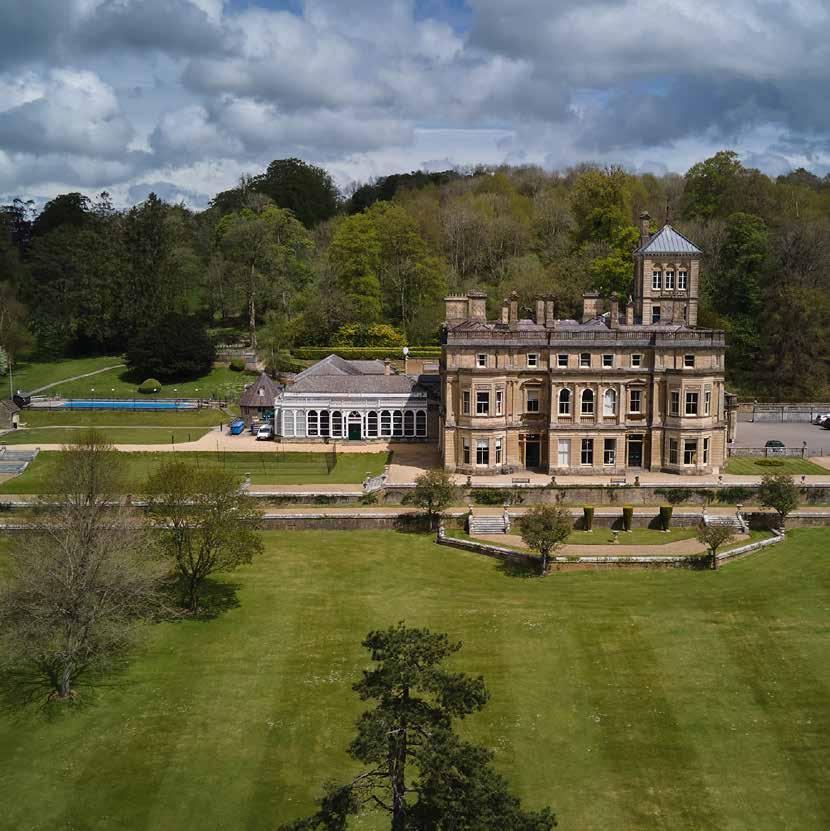
Our campus is set within 230 acres of beautiful Cotswold countryside, located between Cheltenham and Cirencester
